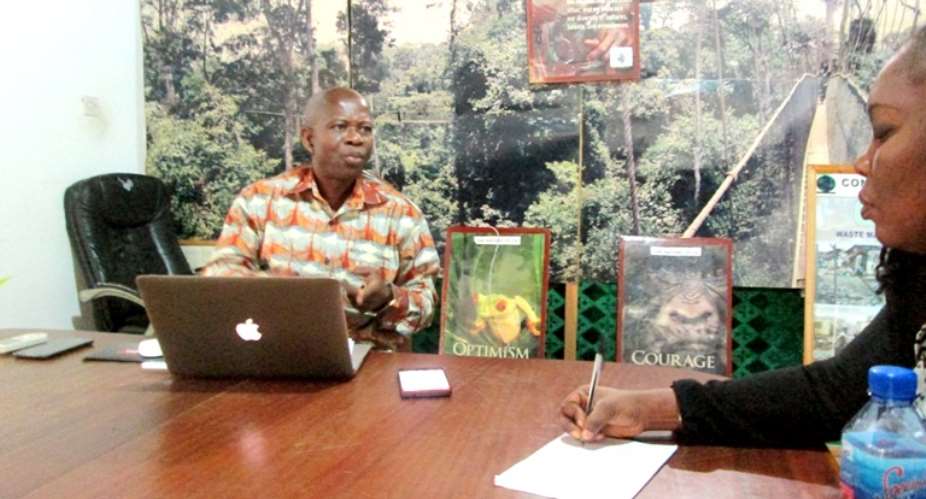Conservation Alliance International, an environmental organization has called for the identification and demarcation of agricultural landscape within sensitive ecological zones as Globally Significant Agricultural Landscapes (GSALs).
In an interview, the Executive Director, Dr. Yaw Osei-Owusu, he indicated that while the government’s policy directions towards the efficient utilization of land, forests and other natural resources appear fantastic, the likelihood of achieving the desired socio-economic and environmental impacts might be limited.
He therefore called for the demarcation of the agricultural production landscapes according to ecological sensitivity to reinforce related public policies on the protection of forests and water bodies.
In spite of the substantial drop in its contribution to GDP (31.8% in 2009 to 19% in 2015), agricultural practices largely account for a significant loss of biodiversity in Ghana. Past efforts to protect forests and other natural resources from agricultural encroachment have yielded limited and often disappointing results. Despite advances in productivity through the use of fertilizers, pest control compounds, higher yielding varieties and adoption of new technologies, the sector is still challenged by abiotic and biotic stresses.
An alternative approach is to identify and map out all agricultural landscapes within sensitive ecosystems, support producers to embrace environmental friendly practices and link them to markets. The GSAL should be selected based on their importance for the provision of local food security, high levels of agro-biodiversity and associated biological diversity, store of indigenous knowledge and ingenuity of management systems. All riparian buffers should be designated as GSAL to ensure compliance to standards that will promote the long-term protection of the water bodies.
The demarcation of the landscape will provide opportunity to explore the option of branding GSAL produced commodities such as cocoa for optimum returns to the farmers and the country. Cocoa farms within GSAL that comply with defined standards should attract additional market value. Under the last NPP administration, the cocoa sector witnessed phenomenal growth in national output and revenue.
Unfortunately, this production levels could not be sustained due to myriad of factors. A deterministic target set by the 2016 manifesto of increasing production to one million metric tonnes and beyond may receive a boost if adequate measures are put in place to reward farmers for adopting the recommended best production practices.
As part of the long term measures, the government could explore the option of branding Ghana’s cocoa based on the GSAL model that supports the production of environmentally friendly quality beans. This could attract a premium (up to 10% of FOB) and thus motivate cocoa farmers to increase production and farm productivity.
While the certification programmes are supporting sustainable production of cocoa, the marginal premium being paid to farmers is a disincentive. We therefore call on the government to take immediate steps to implement this landscape approach for enhancing agricultural production and biodiversity conservation in Ghana.





 Chairman Kingsley Owusu Brobbey calls for Privatization of Electricity
Chairman Kingsley Owusu Brobbey calls for Privatization of Electricity
 Train accident: Four more grabbed and remanded
Train accident: Four more grabbed and remanded
 Gov't to consolidate cash waterfall revenue collection accounts
Gov't to consolidate cash waterfall revenue collection accounts
 Gov't to settle lump sum for retired teachers by April 27
Gov't to settle lump sum for retired teachers by April 27
 Former PPA CEO granted GH₵4million bail
Former PPA CEO granted GH₵4million bail
 Dumsor: The darkness has exposed you; you’ll go down as the worst in Ghana’s his...
Dumsor: The darkness has exposed you; you’ll go down as the worst in Ghana’s his...
 Dumsor: The ‘incompetent’ person provided a timetable whiles those who came to s...
Dumsor: The ‘incompetent’ person provided a timetable whiles those who came to s...
 Defend, ensure NPP’s good works are ‘sold’ and highlight the ‘bad’ state of the ...
Defend, ensure NPP’s good works are ‘sold’ and highlight the ‘bad’ state of the ...
 Bawumia will rank high ahead of Mahama in any anti-corruption test — Salam Musta...
Bawumia will rank high ahead of Mahama in any anti-corruption test — Salam Musta...
 NPP trying to bribe us but we‘ll not trade our integrity on the altar of corrupt...
NPP trying to bribe us but we‘ll not trade our integrity on the altar of corrupt...
